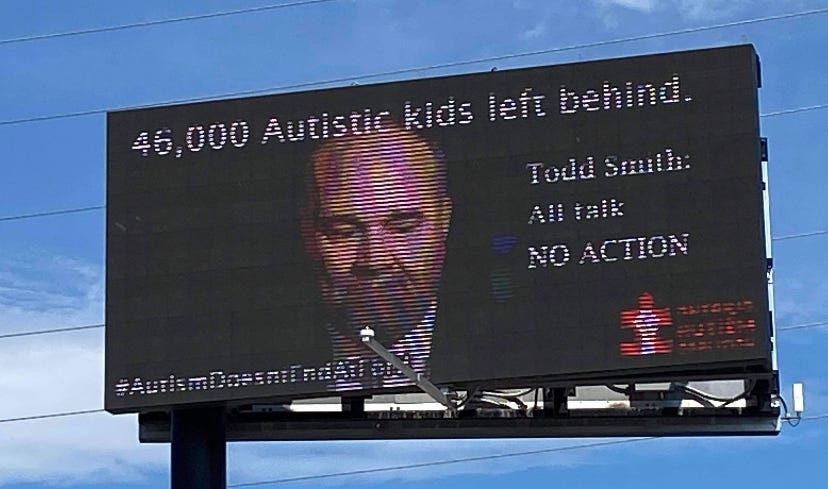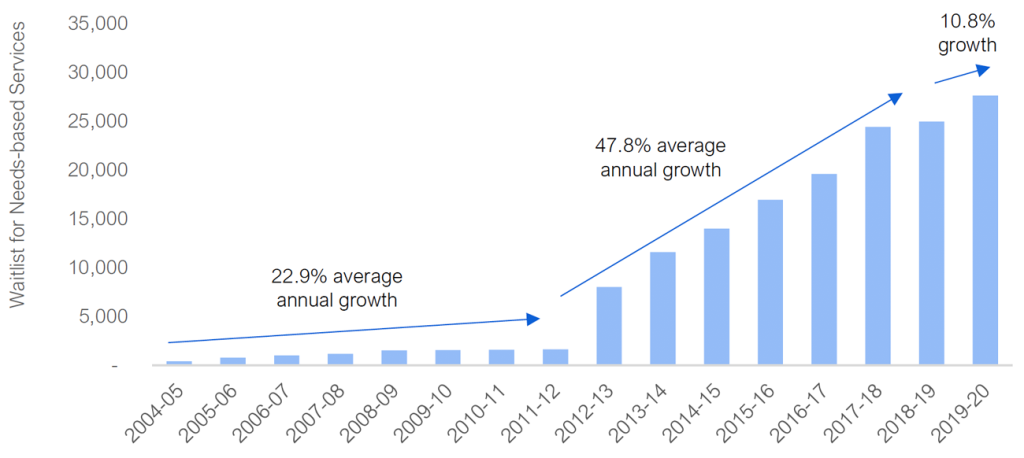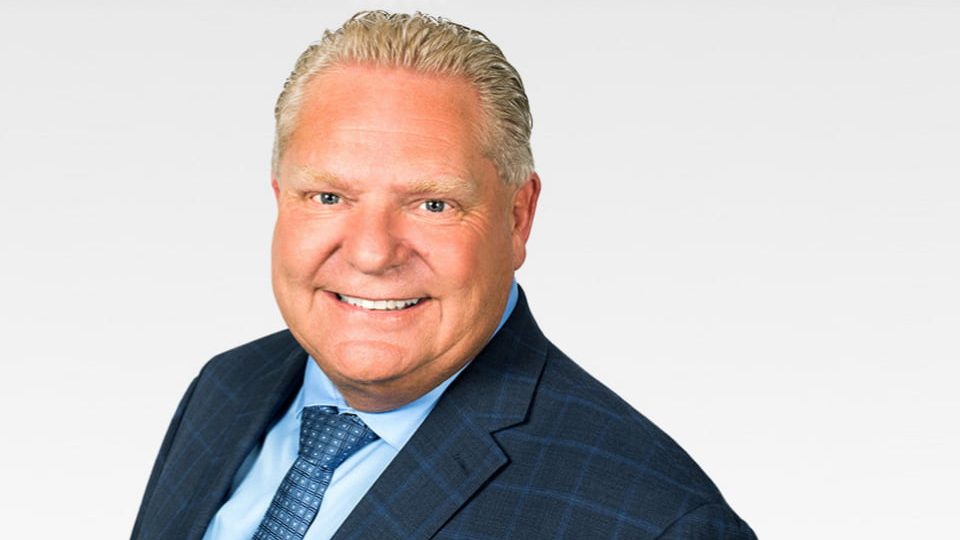Note: Healthcare, including funding for the autism program a provincial responsibility. If you cannot get funding for your child, contact your Member of Provincial Parliament (MPP) and the Premier of Ontario Doug Ford and demand that more be spent on Children and Youth Services.
In 2019, the Ford government increased the annual OAP budget to $600 million, but the Financial Accountability Office (FAO) estimated that $1.35 billion was needed annually to eliminate waitlists for essential autism services. Despite temporary funding boosts in 2022 and 2023, the core funding remains insufficient, and the waitlist for services has grown, with over 50,000 children still waiting for support.
The following timeline highlights the ongoing challenges and criticisms faced by the Ford government. The controversy surrounding the Ford government’s handling of the OAP includes a history of policy reversals, protests, and changes in program leadership, all underscoring the ongoing struggle to meet the needs of families affected by autism in Ontario and has its own Wikipedia entry: 2019 Ontario Autism Program controversy
Funding
In July 2019, Ford government increased the Autism program budget by $277M to $600M annually.
In 2020, the FAO estimated that an annual budget of $1.35B – more than double the government’s current budget of $600 million for autism services – was required to eliminate the waitlist for needs-based service (“core services”) such as behavioural analysis, speech pathology, occupational therapy and mental health services.
The base funding has remained the same for the past 5 years, except for spending more than committed in 2022 and 2023.
In the 2024 Ontario Budget added a one-time investment of $120 million for a total of $723 million, with the FAO expecting funding to drop back to $600M in 2025.
FAO estimates that to maintain the new OAP’s service levels and to ensure that the waitlist does not increase, the Province would need to increase the OAP’s annual budget by $96 million to $696 million by 2025-26. The $96 million budget increase represents $47 million to address population growth (to maintain the waitlist) and $49 million for price inflation (to maintain service levels).
Waitlist (results)
In 2023, there were 70,176 children registered with the new OAP. As of February 29, 2024, a total of 19,966 children and youth had been enrolled in core clinical services and 14,290 children and youth had received payments, receiving an average annual funding commitment of approximately $34,000 in core clinical services in 2023. Therapies can cost up to $95,000 per year depending on the individual needs of the child.
This means over 50,000 children are waiting to be enrolled – the Ontario government is providing services to 28% of those in need of help.
The Ontario government will have to choose between increasing funding beyond its plan or cutting services in the coming years.
Timeline
2014 – Doug Ford opposes a group home for developmentally disabled people, including those with autism
Speaking at a community meeting regarding a home run by the Griffin Centre, a charitable mental health agency that helps those with developmental disabilities, including autism, Ford backed neighbours who are concerned about mental health treatment at a home in their midst, saying the home’s presence has dropped property values in the region down by $150,000 “overnight. and become a “nightmare” for locals.
You’ve ruined the community…
My heart goes out to kids with autism. But no one told me they’d be leaving the house. If it comes down to it, I’ll buy the house myself and resell it.
Etobicoke North Councillor Doug Ford
When questioned about it, he doubled down:
It’s turned into an absolute nightmare in that community. The real estate has dropped $150,000 overnight. This is a middle class neighbourhood, people have worked their whole lives … It’s not about kids with autism, because my heart goes out to families with autism … It’s about kids that have violent behaviour.
Etobicoke North Councillor Doug Ford
After the father of an autistic son filed an integrity complaint against Ford over the scandal, Ford told the Toronto Sun newspaper that the father had launched a jihad against him and that “he can go to hell, I don’t even care.“
2016 – Ontario Liberal Party announced that it would be eliminating government-funded access to intensive behaviour therapy for children aged five and above
After a significant outcry, the government reversed its decision and announced an additional $200 million in funding over the next four years.
June 2018 – PCO promises to add $100M to Ontario Autism Program in their 2018 election platform,
1.12.18 – “An Ontario PC Government will maintain the Ontario Autism Program, but we will enhance it by adding $100 million in the 2018-19 fiscal year. This is an increase of $38 million from the Liberal’s 2018 budget promise”
Only the Ontario PC Party Will Provide More Support for Children With Autism
June 29, 2018 – PCO MPP Lisa MacLeod named Minister of Children, Community and Social Services
2019 – PCO overhauls the Ontario Autism Program
In early 2019, the Ontario government overhauled the Ontario Autism Program in an attempt to clear lengthy waiting lists for autism therapy. Families and advocates, however, argued that the backlog would be eliminated at the expense of the amount and quality of treatment. In addition, rather than increasing investment in the Ontario Autism Program, the Ford government in 2019 maintained the previous Liberal government’s annual budget of $321 million.
In March 2021, the Ontario government started its overhauled autism program. However, it only provided spots to 600 children. To date, the province has not expanded the program to address the waitlist, which is now doubled under the Ford government. Therefore, this promise is considered broken.
Polimeter
February 4, 2019 – PCO MPP Amy Fee decries the state of autism services in the province
Parents have had to leave their jobs to support their child. Many were overcome with emotion just talking about their daily struggles to find help and their extreme stress and anxiety. Most of the families I spoke with just don’t understand why a small number of children get service, while the majority are on wait-lists. And, there are in fact multiple wait-lists. There’s a wait-list to receive a diagnosis, a wait-list to access provincial funding and another for private providers. All this waiting is adding to their stress and keeping children from accessing much needed therapy.
PC Party MPP Amy Fee
February 6, 2019 – PCO MPP Lisa MacLeod announces reforms to the Ontario Autism Program, replacing it with Childhood Budgets to clear waitlist of 23,000 children
The government would be doubling investment in autism diagnostic hubs up to $5.5M, providing direct funding to families instead of to regional service providers, and set the target of clearing the waiting list for the program within 18 months.
The direct funding to families would be front-loaded based on age, was limited to $5000 a year after the age of six, and was limited to a maximum total of $140,000 across the child’s lifetime. The reforms would also establish a government agency charged with assessing funding eligibility for families and providing them advice on which services to purchase.
Criticism
Among the criticisms were that the changes would base funding on age instead of need and that the amount of funding would be inadequate, with the $5000 cap on funding per year risking services for children in need of intensive programmes, which can cost more than that per month.
The reforms additionally would be means-tested, basing funding off of a family’s income instead of off of a family’s needs.
changes were like “assigning a standard amount of physiotherapy to every person with back injuries, whether they actually require back surgery or whether they could just benefit from stretching exercises. It makes no sense and it undermines the needs of children who most deeply require intensive services.”
Janet McLaughlin, professor at Wilfrid Laurier University
Bruce McIntosh, a Progressive Conservative legislative assistant and former president of the Ontario Autism Coalition, announced his resignation as a parliamentary staffer in protest, stating that:
the decisions that the government has made are absolutely wrongheaded.
Bruce McIntosh
March 7, 2019 – PC Party MPP Lisa MacLeod issues apology for threatening a group of Ontario Association for Behaviour Analysis experts, with “four long years’ for the organization” if it didn’t publicly support the government’s reforms
March 7, 2019 – Large protest held at Queen’s Park
MacLeod refused to face the protests and refused to answer questions from journalists that day, stating she feared for her safety. Around a dozen protesting parents had been kicked out of the Legislative Assembly galleries during the day after shouting at MPPs during Question Period. Two days later, a woman was arrested by the Ottawa police force on charges of harassing MacLeod.
March 26, 2019 – PC Party MPP Lisa MacLeod announced program changes in response to the protests
- Scrapping of means testing for the program
- Increase of services eligible to receive funding
- Significant increase in funding for the program
July 2019 – Ford government increased the OAP budget by $278 million worth of Childhood Budgets to $608 million annually
In 2019-20, the Province began the year with a budget for autism services of $331 million but finished the year recording unaudited spending of $608 million. Autism services spending increased by $277 million from the 2019 budget plan as a result of the decisions to allow those children who were already receiving needs-based services a renewal of therapy services for up to 12 months (two six-month extensions), to eliminate the income-test requirement for Childhood Budgets, and to make interim one-time funding payments.
Of the $608 million in total autism services spending in 2019-20, the Province recorded unaudited spending of $271 million for needs-based services, $270 million for Childhood Budgets and interim one-time funding, and $67 million for other services.
Autism Services – FAO (2020)
May 2019 – Premier Doug Ford booed at the opening ceremony for the 2019 Ontario Special Olympics Invitational Youth Games
When asked about it, he said:
“I listen to the real people.”
Asked to clarify he said “they never voted for me in the first place, they’re so proud to tell me that.”
He later said “they won’t vote me for me in 100 years but these are the same people who have their hands in the public trough.”
Premier Doug Ford to Global News
May 2019 – Premier Doug Ford leaves a parent a voicemail, warning them to be very, very, very careful
A parent of two children with autism sent Ford a text message accusing the government of corruption over the cuts. In response, Ford called the parent and left a voicemail, saying:
you got to be very, very careful when you tell someone that they’re corrupt. Very, very, very careful. Okay, my friend? I’ll talk to you later.
Premier Doug Ford
June 20, 2019 – 300 employees autism treatment facility laid off
The company said it had been “significantly impacted” by the Ford government’s changes to the way it funds autism services.
Agencies like ErinoakKids are no longer funded to administer and deliver these services through the public sector, as we have done since inception of the original program in 2000, for successive governments
Instead, families of children with autism are being provided with a Childhood Budget, which they can spend with any provider of their choice.
June 20, 2019 – PC Party MPP Todd Smith named Minister of Children, Community and Social Services
In March 2021, the Ontario government started its overhauled autism program. However, it only provided spots to 600 children. To date, the province has not expanded the program to address the waitlist, which is now doubled under the Ford government. Therefore, this promise is considered broken.
Polimeter
July 2019 – Ford government cancels the reform, asks advisory panel to determine a sustainable program to introduce a needs-based OAP by 2021
October 2019 – Ontario Autism Advisory Panel report calls for changes
- Expansion of core services
- Provision of funding based on an individual child’s needs
- End of the use of seclusion rooms in schools
- Each family being assigned a care co-ordinator with the goal of helping them navigate the government program
- Cover the cost of travel for access to services for people living in Northern Ontario and the need to build more services in the north
July 21, 2020 – FAO report finds wait list had grown by 4,000 to 27,600 children since the election, $1.35B annual budget required to ensureing all children had access to autism services
December 2020 – Ford government releases guidelines to contract out running Ontario’s autism program to an independent agency
The guidelines came under criticism for allegedly ignoring the recommendations of the autism advisory panel and for taking final decisions out of the hands of medical professionals.
The objective of the Call for Applications (CFA) is to select an organization for the role of the IIO in the OAP. The IIO will be accountable for the following functions of the new needs-based OAP program:
- Intake, registration and management of the provincial waitlist;
- Determination of needs process;
- Employment, management and training of OAP Care Coordinators;
- Funding allocation and reconciliation functions for families;
- Establishing Regional Service Networks (RSNs), with one in each of the five defined MCCSS regions, comprised of a range of service providers across key children’s services, health and education sectors, including, but not limited to, public and private OAP service providers;
- Promoting quality improvement and capacity-building initiatives within the RSNs, including the provision of culturally appropriate and accessible information, with a focus on underserved, rural and remote communities;
- Coordinating a dispute resolution process for families; and
- Collection, use and disclosure of data and information to support program administration, planning and evaluation.
March 2021 – 600 children start receiving services in new needs-based program
June 5, 2021 – Ontario Autism Coalition buys billboard in MPP Todd Smith’s riding Bay of Quinte to advocate for families

Minister Todd Smith took over the autism file two years ago and all he has been able to offer families with children with autism is a series of broken promises.
With Minister Smith at the helm, the waitlist for autism services has doubled to over 40,000 children.
Minister Smith broke his promise of having a needs-based program by April 1, 2020. A year later, children are still waiting.
Minister Smith says he spoke with families and stakeholders, but he didn’t seem to listen. He has left the autism community in a state of crisis, with families struggling to access the support their children need. The autism community is fed up.
Join the Ontario Autism Coalition as it unveils their billboard in Minister Smith’s riding, the first in a series of actions targeting the provincial government and its ministers. The autism community has provided advice, asked questions, and waited patiently for too long for the government to create a system that would provide life changing therapy for children with autism in our province.
We’re done talking, it is time for action.
Ontario Autism Coalition
December 3, 2021 – Ford government selects partnership between Accerta Services Inc., McMaster University, Autism Ontario, and HealthCare 365 to run the IIO
AccessOAP is an independent intake organization (IIO) funded by the Ministry of Children, Community and Social Services to help families access autism services across the province. It is a partnership among:
- Accerta Services Inc, a private, for profit insurance service company that manages dental, vision, drug and healthcare benefits programs exclusively for government and social services agencies in Canada. Peter Owsiany is the President and CEO of Accerta.
- Autism Ontario (charitable organization)
- McMaster University (Centre for Health Economics and Policy Analysis (CHEPA) and the Offord Centre for Child Studies)
- Serefin, a private, for profit care coordination company and operator of the Serefin Health Clinic. Skip Schwartz is the founder and CEO of Serefin.
Accerta assembled an interdisciplinary team of leaders from across Ontario to support children and youth on the autism spectrum. Our team combines profound knowledge of Ontario’s autism ecosystem, service delivery, clinical insight, and expert care-coordination with technical proficiency related to intake, registration, and reconciliation of payments. We look forward to leveraging our proven administrative processes to build trust and confidence in the Ontario Autism Program and contribute to better outcomes for children and youth on the autism spectrum.
Peter Owsiany, President and CEO of Accerta
HealthCare 365 is proud and excited to be able to provide the tools and supports that will allow children and their families to have a more coordinated, caring, and managed experience with providers and programs. We are delighted to be involved with a world-class team to create the best experience for children and families in need.
Skip Schwartz, CEO of HealthCare 365
May 18, 2022 – More than 50,000 children with autism on the waitlist
Dax and Travis are just two of more than 50,000 children with autism in Ontario on this wait-list, which has doubled under Doug Ford’s Progressive Conservative government. The PCs faced fierce criticism over their changes to the Ontario Autism Program, which aimed to eliminate the wait-list for treatment by sending funding directly to families rather than to regional service providers. Families are eligible for interim one-time funding, but critics say the money doesn’t go far enough as therapies cost around $2,000 per month.
What Ontario’s major parties are offering for autism funding – CBC (May 2022)
December 2022 – Ford government notifies OAP registrants to sign up with AccessOAP

February 29, 2024 – 19,966 children enrolled in core clinical services and 14,290 had received payments
March 26, 2024 – Ford government adds one-time investment of $120 million for a total of $723 million for OAP in 2024 Ontario Budget
Over the last two years, the Province has exceeded [their commitment of $600 million annually], spending $628 million in 2022-23 and an estimated $691 million in 2023-24.
FAO estimates that the annual Autism program funding level of $600 million, starting in 2025-26, would be sufficient to provide the full annual funding allocation for core clinical services to approximately 10,142 children and youth. If the Province were to maintain the Autism program’s 2024-25 funding of $723 million going forward, then the FAO estimates that this would be sufficient to provide the full annual funding allocation for core clinical services to 12,629 children and youth.
Ministry of Children, Community and Social Services: Spending Plan Review – FAO




Leave a comment
All comments are reviewed prior to appearing on the site.
Rules: